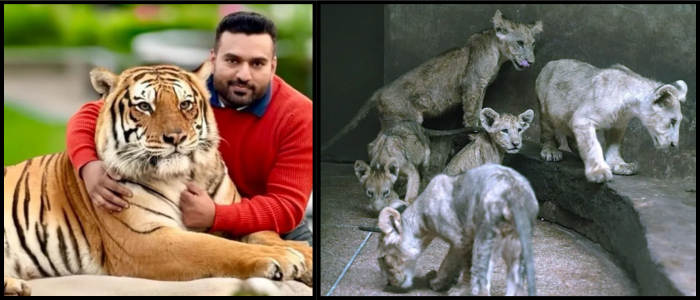For years, big cats like lions, tigers, cheetahs, and jaguars have symbolised power, wealth, and political allegiance in Pakistan. With social media platforms like TikTok and Instagram driving demand, lions have even appeared at weddings. But recent incidents have forced the government to take action. A lion escaped and attacked a woman and her two children in Lahore, sparking public concern and prompting a nationwide crackdown on private big cat ownership.
New Laws, Fines, and Seizures Begin
Under new regulations, owners must pay a one-time registration fee of 50,000 Pakistani rupees ($176) per animal. Each facility can house a maximum of 10 big cats from no more than two species and must be open for public visits. Violators risk fines of up to 200,000 rupees and even prison sentences of up to seven years.
The crackdown is already underway. Wildlife officials raided another property near Lahore after receiving a tip about illegal breeding. They found five lion cubs in cages, but the parents were missing, likely hidden by the owner before the raid. The caretaker, newly hired, was detained for questioning. The rescued cubs have been relocated to a public zoo for medical isolation.
Wildlife officials suspect this is just the beginning. In Punjab alone, authorities estimate that hundreds—if not thousands—of big cats remain undeclared. Mubeen Ellahi, Director General of Wildlife & Parks, predicts it will take at least six months to fully identify the animals in the province, expecting 30-40% to go unreported.
Health Concerns and Future Uncertainty
Officials are also dealing with the consequences of inbreeding among captive big cats in Pakistan. Mubeen noted that inbreeding has caused significant health problems, and some animals may have to be euthanised. The government is still considering the appropriate policy response.
One lion was killed in Lahore in a similar escape incident last December. At Fayyaz's facility, authorities are dissatisfied with the conditions, especially the cage sizes. They've ordered him to convert the space into a public zoo within three months.
Animal welfare advocates believe the government needs to go further. Altamush Saeed, an animal rights campaigner, argues that sanctuaries—not zoos—should be the priority. He also calls for transparency and consistent regulations to protect the welfare of these animals. "We need a systematic solution, not stopgaps," he said.
World

Pakistan Cracks Down on Big Cat Ownership

In the outskirts of Lahore, Pakistan, the distant roar of a lion reveals a hidden world behind the walls of a farmhouse. Inside, 26 lions, tigers, and cubs are housed by Fayyaz, a well-known private breeder who has been selling cubs and breeding pairs for a decade. The 38-year-old operates what is believed to be the largest private big cat facility in the country. Despite the muddy conditions from the rain, Fayyaz claims the animals are content. "They come over, they eat… they're not aggressive," he says, moments before one lion loudly growls—"That one is aggressive, it's his nature," he adds.















